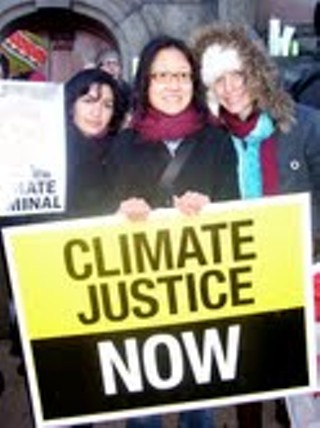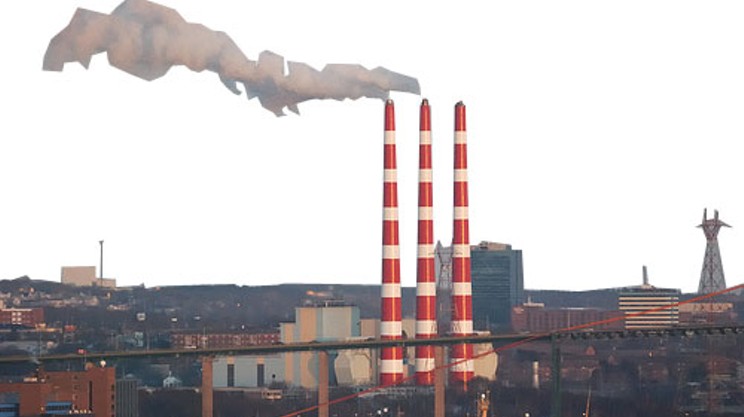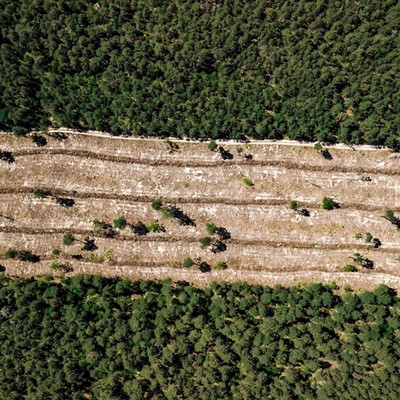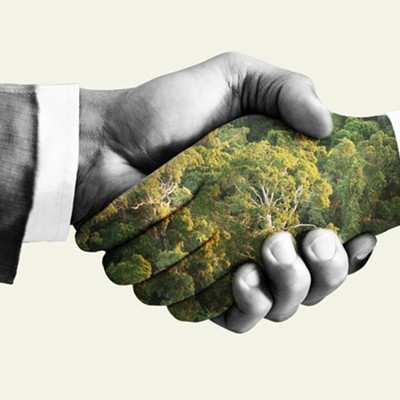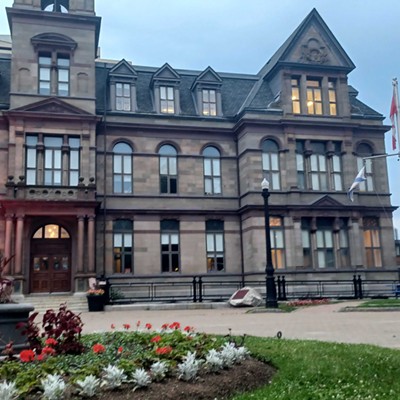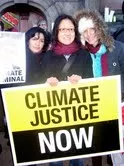
- Canadian Youth Delegation members Kimia Ghomeshi, Toronto; Caroline Lee of Fredericton; and Thea Whitman, Kings County
Kings County's Thea Whitman is one of 30 members of the Canadian Youth Delegation in Copenhagen. The group has garnered a lot of attention for its creative direct actions at the conference and drawing attention to Canada's failure on climate change action. Whitman graciously provided detailed answers (with links!) to my questions.
Q. What is the Canadian Youth Delegation's role in Copenhagen, and how does direct action affect things there?
The Canadian Youth Delegation is a group of around 30 young Canadians from across the country, co-ordinated by the Canadian Youth Climate Coalition.
Here in Copenhagen we are representing the interests of young people, lobbying our elected officials and negotiators, working with international youth, communicating our experience back home by getting media coverage and producing our own new media, and doing actions inside and outside of the conference.
Q. What is it like doing these direct actions in a place where you have potentially a worldwide audience?
Actions have been a big part of what we're doing. We ran one early in the conference on the tar sands using an oil-splattered banner reading "Stop tarring our image," referencing both the problems behind the tar sands and how Canada is blocking negotiations at the conference, which is causing our country to lose our strong international reputation on environmental issues.
We have been involved in international youth actions, including one today where young people from around the world will line the hallway wearing t-shirts reading: "How old will you be in 2050?", referencing the long-term target year for emissions reductions being negotiated, and holding flags from our countries, representing the diverse areas of the world already being impacted by climate change. The rest of the world is beginning to pick up on the fact that Canada is a laggard [as exemplified by the Colossal Fossil award we received last year, and getting international press on this is great.
Being involved in the massive (tens of thousands of people) march through the streets of Copenhagen on Saturday was also awesome. It was fantastic to see how many people care about climate change and are ready to act - from babies to grandmas, people from all walks of life were there. Furthermore, this action ran in parallel with over 4,000 actions around the world including 400 in Canada alone - people really care about this issue and are coming out to show it.
Q. I've been to protests where it feels like the same slogans are being begrudgingly dragged out and chanted ad nauseum, and I've been to others where the creative energy is palpable. It sounds like you are involved in the latter. Can you tell me a bit about the creative process of coming up with direct actions that get positive attention on a world stage?
There is a diverse group of us, on the delegation and among the international youth, who have excellent experience planning exciting and new actions. There is a very strong sense of fun and play in all our actions - as young people, we are not jaded or just expressing mindless anger.
Q. Can you tell me a bit about the emotional experience of being at such an important gathering for the future of our planet? Is it tense, stressful, exciting, fun, scary, all of the above?
Emotions are definitely constantly running high, as the issues that are at stake here really cut straight to the core values many of us hold. It is intensely exciting to be here as history is being made, but the window into the negotiations may be getting foggy, as civil society numbers are to be slashed to 30% starting tomorrow and likely to 0 from Wednesday or Thursday on. This has serious implications for the transparency of the process, not to mention the logistic issues behind the fact that the UN secretariat simply overbooked the 15,000 capacity by 15,000 - accrediting twice as many delegates as can fit in the centre.
Having the ear of Canadian negotiators and Environment minister Jim Prentice is very exciting and pseudo-powerful, but crushing when we basically see our suggestions falling on deaf ears. Canada's emissions reduction target is completely inconsistent with what we need to do, based on science, to safeguard our future, and our negotiators here seem not willing to negotiate.
As youth, we are more often co-opted as a photo op for the minister, rather than really listened to and valued.
Meeting with NS Environment Minister Sterling Belliveau, Environment Deputy-Minister Nancy Vanstone, and Director of the Climate Change Directorate, George Foote today was exciting because there is so much that NS can do to become a leader in clean energy, green jobs, and climate change action.
It is scary because there is so much at stake - it is critical that significant progress is made at these negotiations to ensure that we have new legally binding agreements and commitment on the table before the Kyoto Protocol's first commitment period is finished in 2012.
The G77+China (a large negotiating bloc of developing nations) has just "walked out of negotiations" because of the stance of countries like Canada, who call to abondon the Kyoto protocol.
What's fun and inspiring is working with this amazing and talented group of young people. This group is among the most passionate, dedicated, innovative, intelligent, and motivated groups I've ever had the privilege of working with.
Q. What would be your ideal outcome from Copenhagen, both in terms of your personal experience and the political outcome that would give you hope for humanity and this planet?
The ideal Copenhagen outcome would be a fair, ambitious, and binding treaty. Developed nations should commit to emissions reduction targets of 25-40% below 1990 levels by 2020, based on science, (as the EU and other countries have committed to already), and developing countries commit to reducing their emissions below what "business as usual" would be by 15-30% by 2020.
Significant financing for adaptation and mitigation and an equitable mechanism for its distribution should be finalized. Forests must be included, by introducing a mechanism to provide incentives to reduce deforestation in developing countries and count emissions from land-use changes and forestry in developed countries. Furthermore, this agreement should be legally binding in order to ensure that it is enforced and effective.
As what we know scientifically develops rapidly, we must be able to react to what we learn, which is why we need strong short-term targets and interim review periods, because what we know will develop rapidly.

